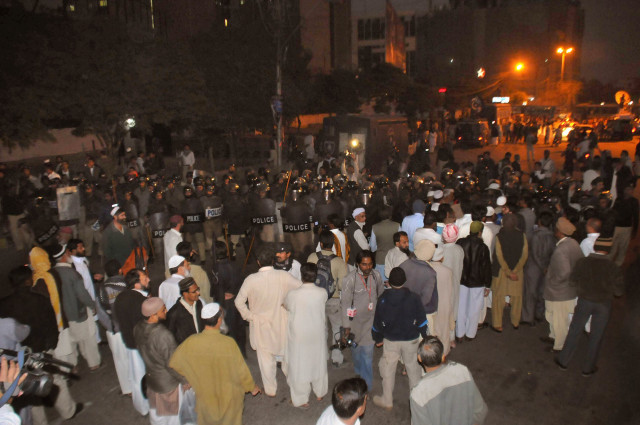KESC protest: Consumers brace for power cuts as workers plan protests
Union leaders fear more employees will be sacked.

The Karachi Electric Supply Company (KESC) workers fearing retrenchment are gearing up to intensify protests in the coming days, raising concerns that incessant power breakdowns will return.
Last year when the management and union of the power utility locked horns over the removal of non-core staff, Karachi saw some of the worst and prolonged labour agitation.
“There is no bowing out of this situation,” said Usman Baloch, a labour union representative. “We will face baton charge, be beaten and injured but only to come back on to the streets with more determination.”
On Friday, police charged at the protesting workers near Governor House as they tried to stage a sit-in for the implementation of last year’s agreement to bring back sacked employees.
Last year’s protests, which continued for weeks, saw disgruntled employees staying away from work, stopping others from fixing broken transmission lines and occupying service stations across the city.
KESC was successful in convincing 3,000 of the 4,000 non-core workers who included drivers, sanitary workers, bill distributors, metre readers and peons to opt for a voluntary separation scheme or golden parachute.
The concern of the employees is not misplaced either. KESC’s management has made it clear that they can either choose the scheme or be kicked out.
It may seem that just one thousand employees in an organisation that employs close to 17,000 people will not be able to bring the system to its knees like last year but the management is cautious. A KESC spokesman, Aminur Rehman, said consumers don’t get their bills on time when there are protests. “The union workers didn’t let outsourced meter readers do their job for three months. So we had to send the bills based on average consumption, which in some cases was inflated.”
The protesters, he alleged, were also involved in cutting off power lines and hijacking servicing vehicles, which are essential to fix problems with pole-mounted transformers.
“If you look at it, the people who were doing small-time jobs have received a good deal,” he said referring to the voluntary separation scheme. “We had paid them Rs1.2 million on average.”
Published in The Express Tribune, January 22nd, 2012.



















COMMENTS
Comments are moderated and generally will be posted if they are on-topic and not abusive.
For more information, please see our Comments FAQ